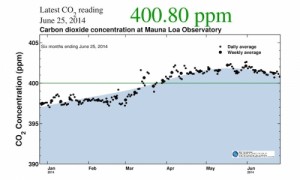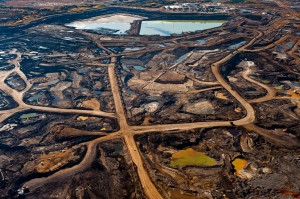Carbon Emissions Just Keep Going Up, Up, Up
Jul 8th, 2014 | By admin | Category: Energy and Carbon EmissionsBy Suzanne York, www.howmany.org
In 2013, the amount of carbon dioxide in Earth’s atmosphere passed 400 parts per million (ppm) for the first time in modern human history.
And now, in 2014, carbon levels have remained above 400 ppm for three months in a row. This makes the past three months the first period of such a duration where human activity has contributed to such a high atmospheric level of carbon dioxide.
It’s been a few years since atmospheric concentrations have been this high – somewhere between 800,000 and 15 million years ago.
The increase in this and other greenhouse gases in the atmosphere has warmed Earth’s average temperature by 1.6°F since the beginning of the 20th century, writes Scientific American.
Should we care?
If you like living on a planet with comfortable temperatures and without too many weather extremes, then yes, you might want to care. If you are typical economist or politician, then the only thing that matters is growth. It’s partly this constant growth mentality that has gotten us into this situation, and is keeping us there.
We really can’t deny that 7 billion plus people are having an impact. Especially those of us who are living a “developed” lifestyle. We are letting unsustainable consumption alter life on Earth, and probably not for the better. And even people struggling to make ends meet who consume little, still have an impact.
Robert Engelman, former president of Worldwatch Institute, put it this way in an interview last year:
But clearly unequal consumption is a huge problem for climate change. Some of us, probably you and me and our fellow Americans, are contributing a lot more to climate change than a person, say, in Mali. But one of the problems is poor countries in terms of their own local environments. Is there enough water in a country like Chad to support another doubling, tripling or quadrupling of its population? That’s not an issue of climate change so much, though climate change might affect it. It’s a question of local resources, arable land, forest, fisheries, renewable fresh water. And that’s the reason that very poor countries, the ones are now growing the very fastest, need to be very concerned about their population growth. And in fact, many of them are.
Humans are a dominant force on Earth. Few of us tread lightly, and most of us have big footprints. Over the past 150 years, greenhouse gas levels have increased 40 percent – mainly from the burning of fossil fuels.
If you want to make a statement, consider joining the Peoples’ Climate March in New York City on September 21st, taking place just prior to a special UN Summit on climate. Need an invite? Read a “call to arms” from 350.org’s Bill McKibben on why people should participate. Organizers are hoping it will be the largest climate rally in U.S. history. It may or may not be, and it may not even make a difference if it is, but it beats sitting around and doing little or nothing about it. There are likely to be local events held at the same time, so stay tuned.
Pieter Tans, a climate scientist with the National Oceanic and Atmospheric Administration, said that “As long as human society continues to emit CO2 from burning fossil fuels, CO2 in the atmosphere and oceans will continue to increase.”
If we continue to ignore this fact, we might as well just stick our heads in the sand.
Suzanne York is a senior writer with the Institute for Population Studies.



